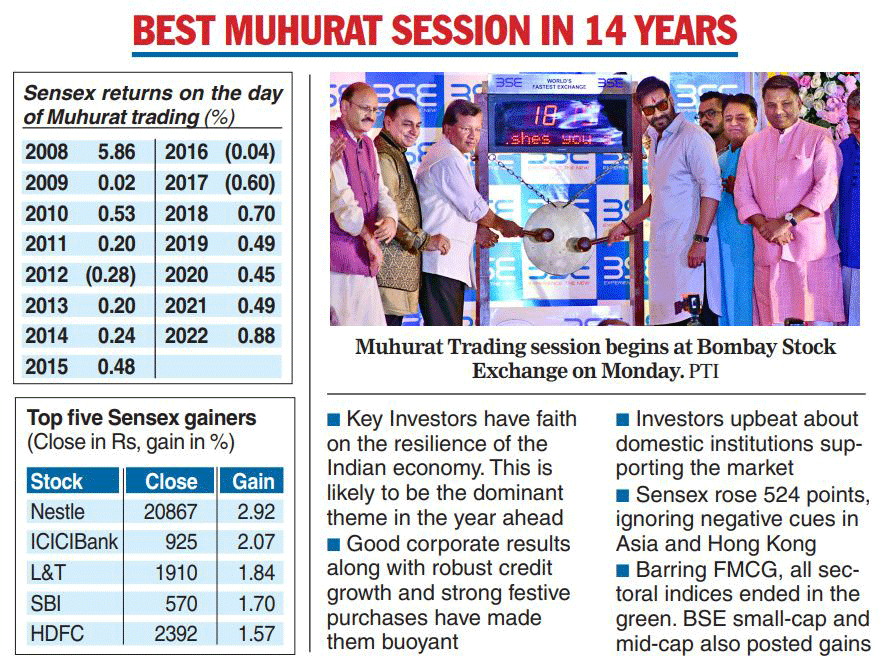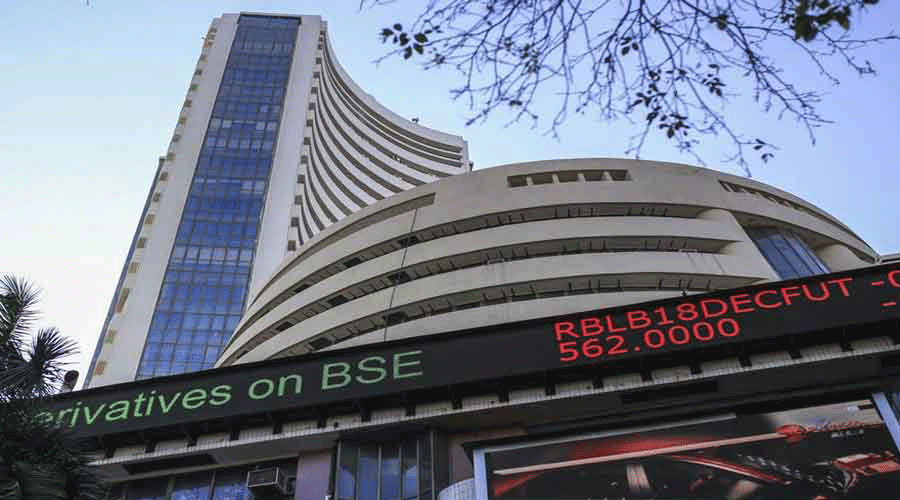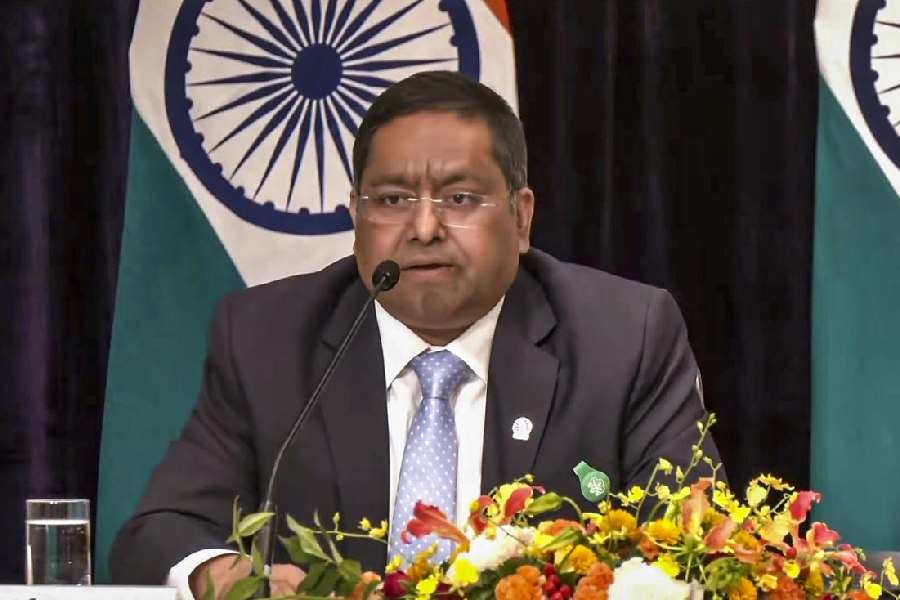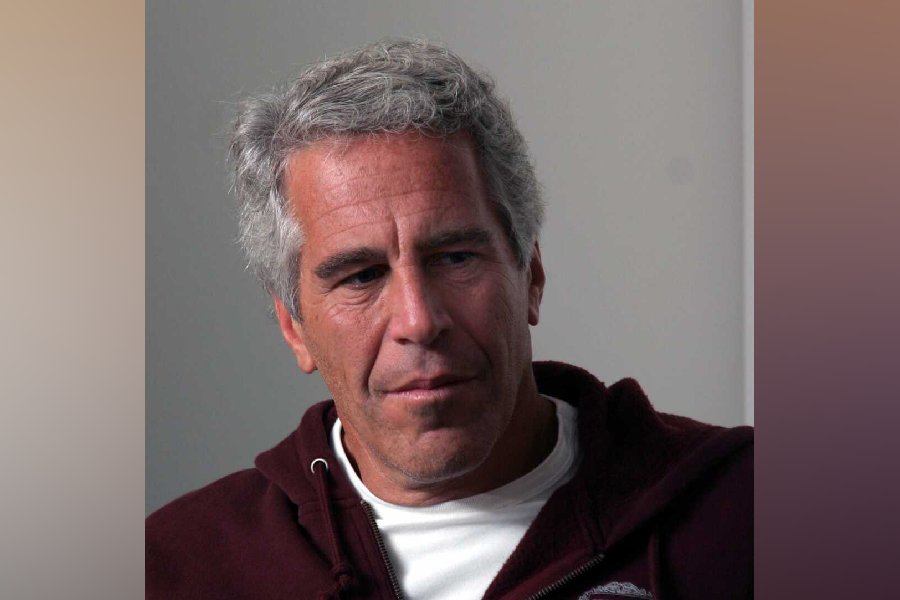Benchmark indices on Monday clocked their best Muhurat trading session in 14 years — thereby raising the prospects of domestic equities being an outperformer for yet another year.
The 30-share Sensex ended with gains of 524.51 points at 59831.66, while the broader Nifty rallied 154.45 points at a special one-hour trading session held on Diwali every year to mark the beginning of the traditional Hindu calendar year, called “Vikram Samvat”.
In percentage terms, they rose 0.88 per cent which is the best return posted since 2008 when the Sensex zoomed 5.86 per cent. This is the fifth consecutive Muhurat session where the indices are ending in positive territory.
This good start to Samvat 2079 came on the back of a rally in banking, financial services, capital goods and even commodity stocks.
Several banking shares were in demand, particularly after the better than expected numbers posted by ICICI Bank over the weekend and credit growth running at decadal highs.
A positive trend in the US and European markets also supported the sentiment. The European markets were upbeat post the announcement that Rishi Sunak would be Britain’s new Prime Minister. The FTSE-100 was trading higher by 0.63 per cent on expectations that its economy would stabilise after a tumultuous three months.
Market circles said the corporate results were a key factor behind the buying momentum.
Reports of strong festive purchases and robust credit growth of almost 18 per cent added to investor optimism as the data showed the resilience of the domestic economy despite the Reserve Bank of India (RBI) hiking the policy repo rate by 190 basis points to control inflation.

“Indian indices ended in the positive territory in the Muhurat trading session inline with most such sessions in the past.
“The indices rose, led by bank stocks, aided by positive cues from the European and US markets and despite the sell-off in the Hongkong and China markets. Investors hope that the positive sentiment could get carried into the new Samvat year despite some macro and global headwinds,’’ Dhiraj Relli, MD & CEO, HDFC Securities said.
The BSE Sensex opened in the green at 59804.02 and built on its gains to hit a day’s high of 59994.25 — a rise of 687 points.
The index fell off the highs to end at 59831.66, a rise of 524.51 points or 0.88 per cent, thereby extending its gains to the seventh straight session.
In the Sensex pack, Nestle led the gainers list by rising almost three per cent. It was followed by ICICI Bank, L&T, SBI, HDFC, HDFC Bank and Dr Reddy’s, which inched up by up to 2.07 per cent. Only two counters closed in the red — Hindustan Unilever and Kotak Mahindra Bank, which lost up to 3.05 per cent.
Global equities were largely in the positive territory following strong gains on Wall Street on Friday.
Elsewhere in Asia, markets in Tokyo and Seoul closed in the green, while Shanghai and Hong Kong plunged to 6.36 per cent, posting their worst day in over a decade.
Barring FMCG, all BSE sectoral indices ticked higher, led by capital goods, industrials, financial services and telecom.
A similar trend was seen in the broader markets, with the BSE small-cap index rising 0.99 per cent and the mid-cap gauge gaining 0.50 per cent.
Analysts said that apart from the ongoing earnings season, the next trigger for the markets would be the upcoming meeting of the US Federal Reserve which is widely expected to raise interest rates by up to 75 basis points.
However, there are reports that some Fed officials are considering a pause or to slow down the pace of sharp rate hikes. It is felt that any indications in this regard early next month will be positive for the markets.
Samvat 2078 saw the benchmark indices falling up to 1.42 per cent. However, it outperformed global indices, due to support from domestic investors.
“The overarching feature of the year gone by was India’s distinct outperformance. While the MSCI World Index and MSCI Emerging Market Index fell 23 per cent and 33 per cent respectively, Nifty hugely outperformed with minor cuts,” said V.K. Vijayakumar, chief investment strategist at Geojit Financial Services.
“This outperformance in a year of a war in Europe and rising inflation and interest rates in the developed world reflects India’s resilience.
“From the market perspective, two factors stand out: One, India’s economic fundamentals are relatively strong. Two, DIIs (domestic institutional investors) and retail investors have become a force to reckon with, overwhelming the FII selling. This trend can be expected to continue,’’ Vijayakumar said.










